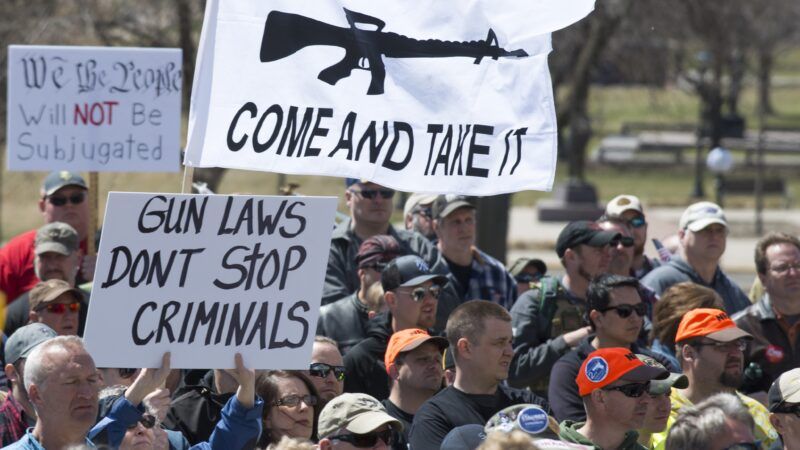California Will Let 'Violence Prevention' Researchers Know That You Have a Gun
An academic field rife with hostility to private gun ownership now gets to know the address of every California owner of a weapon, a weapon part, or ammo.

Califoria Gov. Gavin Newsom signed into law last week A.B. 173, which among other things gives various academics, most of them very likely to be hostile to private gun ownership, access to all the information California collects about the state's buyers of guns, gun parts, and ammunition.
The law says that an assortment of government info about gun possessors "shall be available to researchers affiliated with the California Firearm Violence Research Center at UC Davis for academic and policy research purposes." Furthermore, "At the department's discretion…information collected pursuant to this section may be provided to any other nonprofit bona fide research institution accredited by the United States Department of Education or the Council for Higher Education Accreditation for the study of the prevention of violence."
Yes, the law also insists that "Material identifying individuals shall only be provided for research or statistical activities and shall not be transferred, revealed, or used for purposes other than research or statistical activities, and reports or publications derived therefrom shall not identify specific individuals."
Still, whether or not the resultant research as published names a specific person, a gun owner might understandably not be thrilled that people in the business of coming up with reasons why no one should be allowed to own guns (largely true of people in the "gun violence research" field) can easily know their name, address, and all the weapons, parts, and ammo they bought legally. What's more, nothing in the law as written applies any stern level of oversight or punishment over misuse of the information.
California gun owners have long had reason to be suspicious of the amount of information about gun purchases that the state insists on collecting and saving. These have, after all, led to literal attempts at confisction of certain once-legal, now-not weapons.
In 2018, California passed the California Consumer Privacy Act, which guarantees your right to "delete your personal information [possessed by businesses] and [make them] not…sell your personal information." But that right to keep your information to yourself does not apply when the snoops work for the government.
Roy M. Griffith Jr., legislative director of the California Rifle & Pistol Association, wrote a letter to Newsom asking him not to sign this law. Griffith pointed out that by his read, A.B. 173 "is in direct violation of the California Constitution which states in Article 1, Section 1, 'All people are by nature free and independent and have inalienable rights. Among these are enjoying and defending life and liberty, acquiring, possessing, and protecting property, and pursuing and obtaining safety, happiness, and privacy.' In all, California Constitution names 'privacy' as a fundamental right of all Californians five times!"
With this law, anyone working in or near any academic "violence prevention" work "with an ax to grind, or had fallen from grace, would know that some [named person] with x number of guns lives at 123 Boogie Woogie Avenue in Sunnyvale," says Griffith in a phone interview. That, he notes, may not be a situation conducive to security for the citizen at that address.
Griffith, who used to work in California law enforcement, thinks gun owners' names, addresses, numbers of weapons and parts, and amount of ammunition are data police should need warrants to obtain in any state that alleges to respect privacy. They certainly shouldn't spread it to researchers suspicious of private gun ownership, he adds.


Show Comments (114)